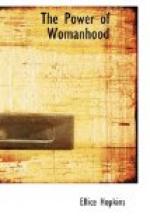Do not, therefore, think impatiently that I am putting you off with vague theories when you want practical suggestions, if I ask you first to give some patient thought to the causes of the disorder which seems to mark the side of our human nature on which the very existence of the race depends, and which cannot, therefore, be evil in itself. To me the problem presented was almost paralyzing. It seemed as if Nature, in her anxiety to secure the continuance of the species, had taken no account whatever of the moral law, but had so overloaded the strength of passion as not only to secure the defeat of the moral law, but even of her own ends, by producing the sterility which results from vicious indulgence. It was not till I met with two wonderful sermons on “The Kingdom of God,” by that great master of “divine philosophy,” Dr. James Martineau, that I first got a clue to the moral difficulty and to that fuller understanding of our human nature which is so essential to all who have the training and moulding of the young. And, therefore, I ask you to let me enter at some length into this teaching, which will not only give us light for our own guidance, but enable us to grasp the right principles on which we have to act in the moral training of the coming generation.[6]
Now, in trying to think out the laws of our own being, we are met at the very outset by the great crux in the moral world: What is the true relation of the material to the spiritual,—of the body, with its instincts and appetites, to the moral personality, with its conscience and will? On the one hand, seeing the fatal proneness of man to obey his appetites and run into terrible excesses, ascetics in all ages and of all creeds have taught that the body itself is evil and the seat of sin; that its instincts must be crushed and its appetites repressed and eradicated; and that it is only so far as you trample your animal nature under foot that you can rise to be a saint. “Brute,” “blind,” “dead,” have been the epithets bestowed on matter, which is a ceaseless play of living forces that rest not day nor night. To look down on the material pleasures with suspicion, to fly contact with the rude world and lose one’s self in the unembodied splendors of the spiritual, to save souls rather than men and women, to preach abstract doctrines rather than grapple with hideous concrete problems—this has been the tendency of the religious spirit in all ages, a tendency of which positive asceticism, with its mortification of the body, and its ideal of virginity, and marriage regarded as more or less a concession to the flesh, is only an exaggeration.
On the other hand, in disgust at the mutilation of human nature and under pretext of its consummation, has arisen the “fleshly school,” whose maxim is “obedience to Nature,”—leaving undefined what nature, the nature of the swine or the nature of the man,—which holds that every natural instinct ought to be obeyed, which takes the agreeable as the test of the right, and which goes in for the “healthy animal” with enlightened self-interest as the safeguard against excesses.




